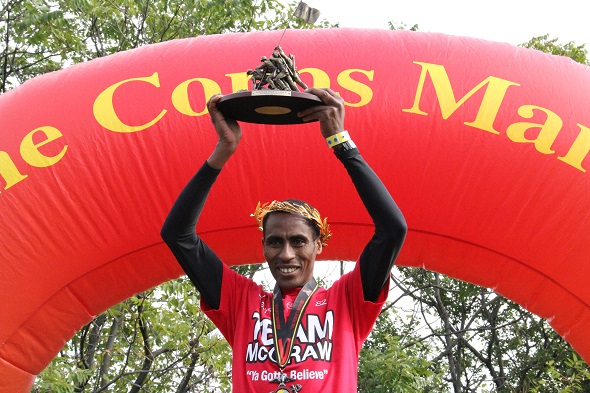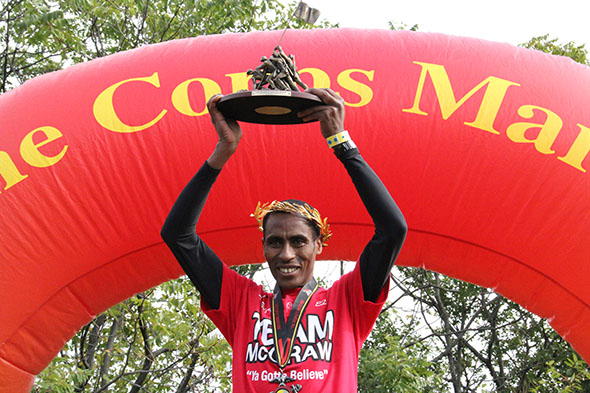WASHINGTON — While what was billed as the world’s largest American flag waved before the opening ceremony of the 38th Annual Marine Corps Marathon Sunday, it was an Ethiopian native who took the top spot before a crowd of about 30,000.
Girma Bedada, 33, flashed a brilliant smile on the winners’ pedestal as he accepted his statue for finishing the third largest U.S. marathon with a time of 2:21:32.
U.S. Coast Guard Lt. Patrick Fernandez of Alexandria, Va., finished second (2:22:52). The 26-year-old won the Historic Half Marine Corps Marathon in May.
His grandfather was a competitive long-distance runner so Fernandez may have inherited his running ability, but “there is no substitute for hard work,” he said.
Army Capt. Kelly Calway of Manitou Springs, Colo., who is about to start her second deployment to Kuwait, snagged the top female running spot coming in at 2:42:17.

Girma Bedada, 33, a member of the national Ethiopian running team, holds his trophy high Sunday after winning the Marine Corps Marathon in 2:21:32. (Marina Cracchiolo / Medill
“This run wasn’t as smooth as the Olympic trails,” said the 29-year-old, who took 25th place at the 2012 U.S. trials.
Calway said she hit a wall at mile marker 22 and started yelling, “I can win this” to keep herself motivated.
Navy Lt. Gina Slaby of Virginia Beach, Va., was the second place female finisher, clocking in at 2:24:08.
No Marine Corps retired or active duty officers finished in the top three for men or women.
To kick off the event, wounded warrior hand-cyclists and wheelchair athletes were first out the gate.
Marine Corps Maj. Kim “Rooster” Rossiter pushed his 9-year-old wheelchair-bound daughter for 26.2 miles. Rossiter led a team of 30 people who volunteered their legs, as he put it, to push people with disabilities in the race. Team Ansley’s Angels, a foundation named in honor of his daughter, raises money to buy racing wheelchairs.
The athletic duo traveled from Virginia Beach, Va., where he’s stationed at the Dam Neck Navy and Marine Corps Intelligence Training Center, to run their second — and final — marathon together because Ansley’s health is deteriorating from a rare genetic nerve disorder.
The race events were especially significant for retired Marine Jacob Fox, who walked in the 10K Sunday — his first race since receiving a prosthetic leg.
“It reminds me that life goes on. There are people who have it worse,” said the 21-year-old.
Fox, of Fairfax, Va., lost his right leg in 2011 when he stepped on an improvised explosive device in Sangin, Afghanistan.
Security was tight Sunday in the wake of the Boston marathon bombing in April that left three people dead and hundreds injured.
The bombing was on many runners’ minds, but 20-year-old Nicholas Jackson said safety concerns didn’t stop him from lacing up his shoes as the sun rose on the crisp fall morning.
“People talked about it (Boston) but I’m not really afraid. But it did cross my mind,” Jackson said.
Police officers roamed the finish line as the sea of Marine staffers and race organizers implemented heightened security measures, including barring racers and spectators from wearing hydration packs, checkpoints at the start and finish lines and random bag screenings.
Also, all runners were required to use clear plastic bags to place their belongings in as they ran along the new marathon course, making their way through national parks in Washington and northern Virginia.
For many runners, the race’s significance outweighed security concerns and their reasons for participating ranged from winning to healing.
Michele Schaefer, of Bayville, New York — joined by 15 of her college friends — ran in honor of her brother, John, a Marine who took his life after suffering from post-traumatic stress disorder after two tours in Iraq.
Schaefer said she and her brother ran the 10K Marine Corps Marathon together and visited the graves of some of his fallen fellow Marines at Arlington National Cemetery prior to his death in 2012.
“It’s bittersweet. This is the first time running without him. The first of many firsts,” she said.

